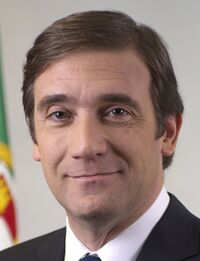Consul of Latium
| Consul of Latium | |
|---|---|
 Coat of Arms His Majesty's Government | |
| Government of Latium | |
| Style | The Most Renowned His Excellency (in international correspondence) |
| Member of |
|
| Reports to | The Monarch and The Senate |
| Residence |
|
| Appointer | The Monarch |
| Term length | At the Emperor's pleasure |
| Inaugural holder | Gaius Vitellius Tricostus & Appius Cloelius Siculus (traditional) Thomas Anicius 1st, Duke of Beroea (modern) |
| Formation | 6th century BC (traditional) 1866 (modern) |
| Salary | $189,451 (including $91,316 Senator's salary) |
The Consul of Latium (Latin: Consul Latii) is one of the oldest positions in the Senate and the entire government of the Latium. The Consul is the highest ranked elected representative in Latium, who is the de facto head of government. The position was first created as the leader of the ancient government of Castellum before the transition to the monarchy and Latin Kings of Alba. From the position's inception until the 6th century BC, consuls were elected or appointed to act as the primary magistrates the city and its subordinate territories, in most instances acting as the primary military commanders and head of state. While the creation of the consulship remains lost to history, the earliest verifiable Consuls of Castellum were Gaius Vitellius Tricostus and Appius Cloelius Siculus, holding the consulship of 593 BC. With the creation of the Latin monarchy in the form of the Alban kingdom of Castellum, the position of consul became more ceremonial in nature, though remained one of high importance and prestige.
Today the office exists only by long-established convention and later legislation, which stipulates that the monarch appoints the person most likely to command the confidence of the Senate as as Consul. This individual is typically the leader of the political party or coalition of parties that holds the largest number of seats in the legislative body. The position is similar to that of a prime minister. The modern conception of consul came about in the early 19th century, as the position was merely an honorary role prior.
The current Consul is Alexander Pompilius of the United Latium.
History
Prior to 1866, the consul closely resembled its ancient and medieval counterpart; two consuls were selected from the Senate to serve a term of one year, with no individual allowed to serve twice as Consul within a span of five years. While holding no more power than that of a regular senator, the consulship was still a position of prestige. During the reign of Theophylactus I Augustus, the Emperor appointed his younger brother and prominent general, Thomas Anicius, 1st Duke of Beroea, to serve his second Consulship for the year 1866. Upon his appointment, the Duke refused to allow his counterpart, Michael Sulpicius, a seat at the head of the Senate next to the Theophylactus, which the Emperor assented. Over the course of the year, the Duke and Emperor Theophylactus instituted a number of democratic reforms and changes to the constitution, most important of which relegated his counterpart to a deputy role and replaced the ancient role of the Consul with one similar to the Consul we see in Latium today.
The consul, in its current form, dates from the reforms of Theophylactus, and later the Acts of Constitutional Reform. Under the Acts of Constitutional Reform, the consul was presented with the same powers as a prime ministerial counterpart. In practice, however, the consul was still a fairly weak figure, serving as little more than the cabinet's "primus inter pares". The reforms of Leo and Diana after the Social War resulted in the consul playing a much greater role in the day-to-day governance, transitioning the post to the de facto head of government.
Role
The Consul is appointed by the Monarch, serving at the Monarch's pleasure, so long as he or she maintains confidence, resulting in the Consul being primarily responsible only to the Monarch. In practice, however, a Consul must maintain support from the Senate, or else face a possible resignation (though the Senate may not appoint a replacement). The Consul is the first among equals of Magisterial Offices. Unlike some parliamentary systems, the consul serves as the presiding officer, or speaker, of the Senate, where he or she will supervise the conduct of its business. This role provides a consul the ability to directly control what does and doesn't reach the floor for reading, debate, and vote.
When an Act of the Senate receives Imperial assent, the Consul, often along with the Master of Offices, is charged with ensuring proper execution of laws at the Monarch's direction.
Magistrate Office
The consul is is the first among equals of Magisterial Offices, and nominally the most powerful office among the Emperor's Council. A convention of the constitution, the modern Cabinet is a group of ministers who formulate policies – under Monarch's supervision. As the political heads of government departments, cabinet ministers ensure that policies of the government are carried out by permanent civil servants. All Cabinet appointments are made by the Emperor from among sitting senators.
The growth of the Council met with widespread complaint and opposition because its meetings were often held in secret and it excluded the Senate at large, focusing on the Emperor and his court. The early Cabinet, like that of today, included the Defense Minister, Treasury and other department heads who were selected by the Emperor. However, it might also include individuals who were not members of the Senate such as household officers (e.g. the Master of the Horse) and members of the Imperial family.
Magisterial positions
An individual may also serve as Consul while concurrently serving as the head of a council magistrate office. Most often this occurs when a vacancy arises in either the Consulship or a ministry on an interim basis.
Deputy Consul
The Deputy Consul traces its history back to one of the original two positions in ancient Castellum, and even Alban tribal, yearly consul posts. The position began to evolve into a deputy's role when Thomas Anicius, 1st Duke of Beroea, one of the co-consul's for the year 1866, refused to allow his counterpart to ascend to the second consul's chair in the senate, initiating the constitutional reforms of Theophylactus I Augustus. Since that day the Deputy Consul serves a subsidiary role to the Consul, taking the position of acting consul when the consul is temporarily absent. However, except in extreme circumstances when a consul immediately resigns, a resigning consul will typically continue to serve until they are replaced as their party leader in a party-wide election. Since 11 March 2016, the office of Deputy Consul has remained vacant.
Selection
Appointment of Consul is left to the sole discretion of the Monarch, to whom the Consul is solely responsible. In common practice, a Consul is appointed from a member of a leading political faction in the Senate of Latium, as a result the Senate may be able to force a Consul to resign.
Eligibility
As a practical matter, the Consul is often the leader of a party whose members form a majority, or a very large plurality, of Senators – though this is not required with the most recent non-party leader consul, Constantine Otacilius from 2001 until 2014. Legally, this may be any citizen of Latium of voting age (17 years and over)—the requirements to gain election to the Senate. It is not actually clear as to whether there are age or citizenship restrictions on the position of the consul itself, as it is not necessary for the incumbent to be a sitting Senator. However, this is more of an unlikely question since the conventions involved in selecting the consul make the appointment of anyone ineligible for election to the Senate difficult.
Should a sitting consul lose his or her seat in the legislature (or should a new consul be appointed without holding a seat), the typical process that follows is that a junior member in the governing political party will immediately resign to allow the consul to run in the resulting by-election. A safe seat is usually chosen. However, if the governing party selects a new leader shortly before an election is due, and that new leader is not a member of the legislature, he or she will normally await the upcoming election before running for a seat in the Senate.
Compensation
Since 2001, the consul has earned a $189,451 annual salary, along with a $50,000 annual expense account, a $100,000 nontaxable travel account, and $20,000 for entertainment, along the a $91,316 salary for Senators. The most recent raise in salary was approved by the Senate and Emperor Jason VI Augustus in 1998 and went into effect in 2000.
20 Via Julia in Castellum, serves as the official place of residence for the consul. As well as access to the Consular staff, facilities available to the consul include medical care, recreation, housekeeping, and security services. The government pays for state dinners and other official functions, but the consul pays for personal, family and guest dry cleaning and food; the high food bill often amazes new residents. Abula Hill is used as a country retreat and for high alert protection of the consul and guests. Palatine House, located near the base of the Palatine Hill, is a complex of seven connected townhouses exceeding 100,000 square feet of floor space which serves as the consul's official office, a secondary residence for the consul if needed, and occasionally serves as a guest house for state visitors due to it's proximity to the Palace.
The Praetorian Guard is charged with protecting the consul and their family for the duration of their Consulship, and even after. Before 1993, post-Consulship security was handled by private security firms of the former consul's choice, paid for via state pension funds of the Consul. Consul's may receive a pension after their time in office that is apportioned based on need; this type of pension has only been collected on one time by Consul Valentinian Poppaea, who was diagnosed with prior to the 1985 general election, prompting him to step down.


